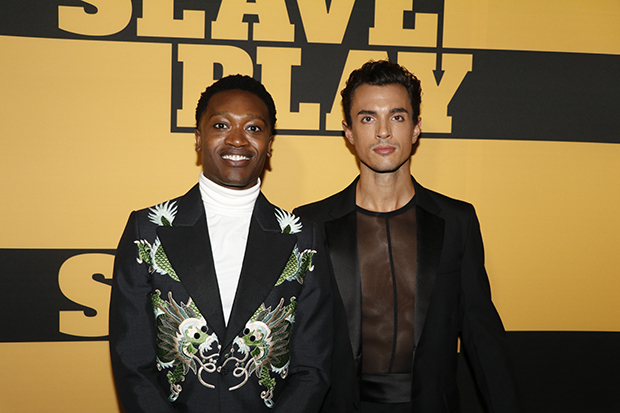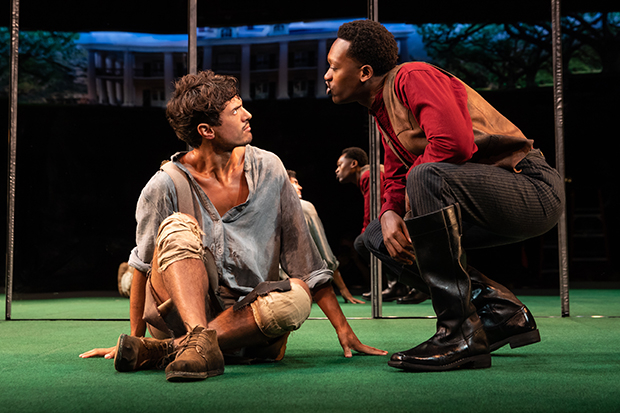Interview: Ato Blankson-Wood and James Cusati-Moyer on Being BFFs and Starring in Slave Play
Ato Blankson-Wood and James Cusati-Moyer met the summer before the went to grad school at Yale. "It was Ato's birthday party," Cusati-Moyer remembers. "I was told by a mutual friend that Ato and I were going to be best friends." Blankson-Wood was told the same thing by the same mutual friend. Though both had a bit of natural skepticism, it was "pretty early on," Blankson-Wood recalls, that they realized it was true, "just kindred spirits." "We had this natural gravitational pull," Cusati-Moyer adds, "not just in the classrooms, but as human beings. We have this sense of home within each other."
Jeremy O. Harris came into their orbit the summer before his first year at Yale, after they both had graduated. They all became friends, eventually being introduced to a script that Harris was working on with characters loosely inspired by them. That script became Slave Play, an off-Broadway sensation at New York Theatre Workshop that turned into not only an even bigger hit on Broadway, but a cultural touchstone, one that would lead Blankson-Wood and Cusati-Moyer to their first Tony nominations.
Together, they play Dustin and Gary, a young couple undergoing a kind of sexual performance therapy designed to improve intimacy between white and Black partners. "James and I have said before that the veil between us and these characters is very thin," Blankson-Wood notes. However, he is quick to clarify: "They're not us. There are major ways in which we differ, but there are a lot of similarities. These roles, in some ways, felt like a reach, but in terms of access points, there were many."
The two roles are not only intense emotionally, but physically. But being able to do it together — with a built-in safety net developed over the course of many years — made all the difference.

(© Janie Willison)
What went through your head when they told you that Slave Play was going to Broadway?
James: First, it was a dream come true that we were taking this story, this play, this cast, directly to a Broadway stage. And then Ato and I both had a moment of "OK, here we go." But it was a dream come true. Through closing on Broadway, Ato would look at each other and go, "I can't believe I'm doing this play with you on Broadway."
Ato: It was pretty wild. I'm such a theater nerd. I've been a theater nerd since I was a kid. To understand the subject matter of this play, the form of this play…This play is not your standard Broadway fare. When I heard we were going to Broadway, I was like "Really? OK. Let's say yes." I was really excited to be the quote unquote misfits of Broadway at that time. People being like "This show?" There was something really exciting about feeling like we were the problem children of Broadway at the moment.
It seems like quite the opposite happened — Slave Play was pretty much embraced.
James: Generally, yes. But there was some contrast within certain audience members during certain shows. The amount of rage Ato was speaking of, the number of intimate things Ato and I did together onstage, we could hear and feel people's discomfort five rows in, or even in the back of the house. We were constantly aware of that. It didn't shift what we did, but the temperature always shifted.
Ato: From night to night. This is also a great moment to shout out the fact that yes, there is a sort of standard Broadway audience, but this production really did the work to shift that paradigm and make sure this show was accessible to people of color, to younger folks, to people who had not traditionally been invited into Broadway space. The audiences did shift from night to night, but we had the great fortune of having producers who were interested in making sure it was seen by people who it was written for.

(© Matthew Murphy)
How did you get through doing these intense and demanding roles over such a long period of time?
James: For the entire cast, every single role was an exhausting, fulfilling experience. But specifically with Ato and I, our track, the amount of physical combat and choreography he and I had to go through, and the emotional gymnastics he and I had to go through, there were some hard days, for sure. There were days in which we didn't know if we could do it. But we never called out. The beautiful thing about our friendship and our relationship as colleagues and scene partners is that all it took for me to get that next moment of strength on stage was to connect with each other with our eyes. All I had to do is look over and see the person sitting next to me, and that gave me the fuel and this beautiful safety net to get through the show. I could not have done this show without Ato, and our relationship. No other person.
Ato: I feel 100 percent the same. Our characters held a lot of the rage in the play, and in hindsight, that emotional lift was super, super difficult. I think about all the groundwork that was laid at grad school. We did a production of The Master and Margarita, and our director, Sara Holdren, did this thing where we went around in a circle as a warm-up and said, "I will hold you up. I will never let you down." That was a mantra that sustained specifically James and my relationship through this play. We will get through this together. We really held each other up through having to live through all of that rage.
Given your relationship and having gone through this together, what do these nominations mean to you?
James: Ato and I are very similar in our upbringing. We grew up both in the theater. Nothing was ever handed to us. We have worked really hard our entire lives to make a life and career in theater. The honor that it is to be nominated in this play is more than I can comprehend. But the important thing is that…What does a life in theater mean? It's not about the things or the money or the awards; it's about the amount of joy that you feel. In my opinion, we won the second that Ato and I stepped onstage together. That's the ultimate reward.
Ato: A lot of the identifiers that James and I walk through the world with, as people who have not been handed things, as people who have worked hard in this business, were presented to us as things that were going to be hinderances. I was told that there were certain things about my queerness that I needed to tamp down in order to have a career. There were things about my Blackness I needed to tamp down in order to have a career. And we got to present ourselves in our full identities and then be celebrated for those things. Here I am, in this very queer, very Black role, being celebrated. That means a whole lot to me on a personal level. But also, just on a level of soul and kinship with James…We've been doing this in black box theaters, in basements. To now be celebrated on the largest theatrical platform, is really incredible. The work we have put in is being celebrated, and that is what I'm focused on. I'm so pleased by that.










